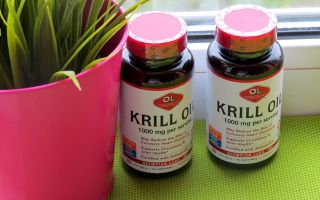Content
The benefits and harms of krill oil are not yet well researched. This product appeared on the supplement market relatively recently, but has already gained popularity due to its many beneficial properties. Despite its insufficient knowledge, it is widely used in medicine and cosmetology.
What is this oil
Krill oil is obtained from small crustaceans belonging to the Euphausid family. These are small crustaceans that live in Antarctica. The annual production of these animals is about half a million tons, and they are mainly used to create fish feed.
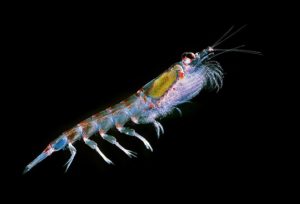
Krill oil is similar in composition to fish oil, however, it has some structural differences. Acids Omega-3 they have a phospholipid rather than triglyceride structure.
Krill oil chemistry
Krill oil contains vitamins:
- A - 10 μg;
- PP - 1.7 mg;
- E - 0.6 mg;
- group B (B1, B2, B6, B9 and B12) - a total of 0.03 mg.
The amount of vitamins contained in 100 g of the product is given.
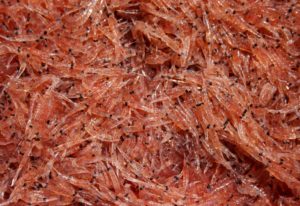
Krill oil is composed of the following fatty acids:
- Omega-3 - 44 g;
- eicosapentaenoic acid - 20.3 g;
- docosahexaenoic acid - 20.1 g;
- Omega-6 - 3.2 g;
- linoleic acid - 2.7 g;
- alpha and gamma linoleic - 1.1 g
The mineral composition of the fat is as follows:
- sodium - 565 mg;
- phosphorus - 137 mg;
- potassium - 94 mg;
- magnesium - 70 mg;
- calcium - 42 mg;
- iron - 4 mg;
- fluorine - 2.8 mg;
- iodine - 50 mcg.
The product also contains the antioxidant astaxatin and many amino acids.
The benefits of krill oil
The beneficial properties of krill oil are primarily due to the omega-3 polyunsaturated fatty acids. They improve the work of the cardiovascular system, prevent strokes and ischemia.
Thanks to the phosphorus and calcium contained in the product, the skeletal system of the body is nourished, as well as the improvement of the joints.

The product also manifests its beneficial properties in the effect on brain tissue: memory and concentration are improved. This is especially noticeable in children and adolescents, as well as elderly people suffering from age-related changes in brain tissue.
Due to the presence of antioxidants, the product is used as an anti-aging agent and for the prophylactic therapy of cancer.
The product has been scientifically proven to improve visual function and to prevent cataract development.
A beneficial property of the oil is to weaken PMS and reduce pain during menstruation.
Eicosapentaenoic acid and docosahexaenoic acid are mild neurostimulants and can help overcome depression.
The beneficial (as well as harmful) properties of krill oil for children are not well understood. On the one hand, it is an excellent substitute for fish oil, on the other hand, it is an exotic supplement that may contain impurities harmful to the child's body. Therefore, its use is permissible only after consulting a pediatrician or doctor.
How to take krill oil capsules
The daily dosage of krill oil is from 1 to 2 g. The capsules usually contain 500 or 1000 mg of the product, that is, you need to take 1-4 capsules per day.
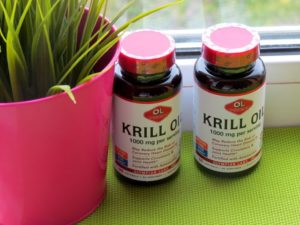
For maximum benefits, it is recommended that this supplement be taken orally in the morning or afternoon with meals. That is, two pills at breakfast and two at lunch.
Usually, courses of 1 or 2 months are recommended, after which a break is required. Resumption of taking the drug - six months after the start of the previous course.
Which is healthier: krill oil or fish oil
The Omega-3 polymer molecules found in fish oil and krill oil are slightly different. The lipids (the molecules that make up the fat) in krill oil have a phosphorus atom instead of a carbon atom in one of three long hydrocarbon chains.
This change in the molecule theoretically makes it more easily digestible compared to fish oil. However, in practice, there is still no confirmation that fish oil is absorbed worse than krill oil.
Fish oil cannot boast of having a large amount of antioxidants, while Antarctic krill has a lot of them (the same astaxatin).
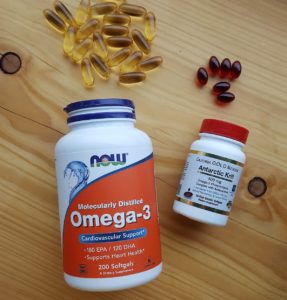
On the other hand, Antarctic krill oil contains many anthropogenic toxic substances (for example, polybrominated diethyl ether). Removing such substances from krill oil is difficult and often not done.
Therefore, it cannot be said unequivocally which is more useful. On the one hand, thanks to antioxidants, krill oil has more beneficial properties, but the concentration of toxic substances contained in it is almost never monitored. And in each individual batch of this product, the concentration of substances similar to polybrominated ether may be different.
The harm of krill oil and contraindications to use
The product is rarely used by humans today. Therefore, the study of both harmful and beneficial properties has actually just begun. The harmful properties of krill oil have not yet been studied in detail, however, something can already be said with confidence.
The harm to the product is primarily due to the possible high concentration of toxins that enter the body of crustaceans from the environment. Like most seafood, they are highly vulnerable to the negative effects of ocean pollution.
The harmful properties of krill oil are common to all marine life in Antarctica: a relatively high concentration of heavy metals and a large amount of biological toxins.

This means that, despite the numerous beneficial properties, the product should be used with caution in children and pregnant women, as well as in categories of patients with problems with the liver and excretory system.
Other harmful properties of the oil are individual intolerance and allergy to seafood.
How to choose krill oil
The main criterion for choosing a product is its degree of purification. Therefore, when buying medicines or food supplements, it is necessary to familiarize yourself with the certificates of its origin and compliance with medical standards.
And the price does not play the main role here, it cannot act as a guarantee of product quality. Although, the probability of getting a product practically devoid of useful properties, at its low price, will be quite high. You can only choose a product that has passed laboratory tests and does not have harmful impurities.
Conclusion
The benefits and harms of krill oil are currently a matter of debate. On the one hand, it is an excellent fish oil substitute that has numerous benefits from its antioxidant and protective properties. On the other hand, it is a potential source of problems related to the ecology of krill habitats. In any case, when choosing this product, you should use common sense and pay attention to the manufacturer.

